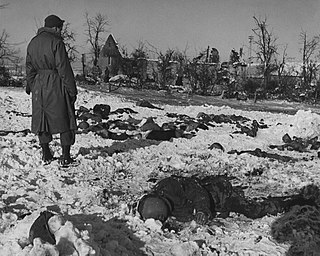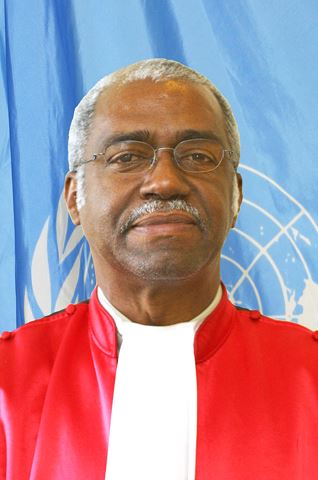Related Research Articles

Genocide is the intentional destruction of a people in whole or in part. In 1948, the United Nations Genocide Convention defined genocide as any of five "acts committed with intent to destroy, in whole or in part, a national, ethnical, racial or religious group." These five acts were: killing members of the group, causing them serious bodily or mental harm, imposing living conditions intended to destroy the group, preventing births, and forcibly transferring children out of the group. Victims are targeted because of their real or perceived membership of a group, not randomly.

The Nuremberg trials were held by the Allies against representatives of the defeated Nazi Germany for plotting and carrying out invasions of other countries and atrocities against their citizens in World War II.

A war crime is a violation of the laws of war that gives rise to individual criminal responsibility for actions by combatants in action, such as intentionally killing civilians or intentionally killing prisoners of war, torture, taking hostages, unnecessarily destroying civilian property, deception by perfidy, wartime sexual violence, pillaging, and for any individual that is part of the command structure who orders any attempt to committing mass killings including genocide or ethnic cleansing, the granting of no quarter despite surrender, the conscription of children in the military and flouting the legal distinctions of proportionality and military necessity.
Universal jurisdiction is a legal principle that allows states or international organizations to claim criminal jurisdiction over an accused person regardless of where the alleged crime was committed, and regardless of the accused's nationality, country of residence, or any other relation to the prosecuting entity. Crimes prosecuted under universal jurisdiction are considered crimes against all, too serious to tolerate jurisdictional arbitrage. The concept of universal jurisdiction is therefore closely linked to the idea that some international norms are erga omnes, or owed to the entire world community, as well as to the concept of jus cogens – that certain international law obligations are binding on all states.

Crimes against humanity are widespread or systemic criminal acts which are committed by or on behalf of a de facto authority, usually by or on behalf of a state, that grossly violate human rights. Unlike war crimes, crimes against humanity do not have to take place within the context of wars, and they apply to widespread practices rather than acts which are committed by individuals. Although crimes against humanity apply to acts which are committed by or on behalf of authorities, they do not need to be part of an official policy, and they only need to be tolerated by authorities. The first prosecution for crimes against humanity took place during the Nuremberg trials. Initially considered for legal use, widely in international law, following the Holocaust, a global standard of human rights was articulated in the Universal Declaration of Human Rights (1948). Political groups or states that violate or incite violations of human rights norms, as they are listed in the Declaration, are expressions of the political pathologies which are associated with crimes against humanity.
The crime of apartheid is defined by the 2002 Rome Statute of the International Criminal Court as inhumane acts of a character similar to other crimes against humanity "committed in the context of an institutionalized regime of systematic oppression and domination by one racial group over any other racial group or groups and committed with the intention of maintaining that regime".

Hans Axel Valdemar Corell is a Swedish lawyer and diplomat. Between March 1994 and March 2004 he was Under-Secretary-General for Legal Affairs and the Legal Counsel of the United Nations. In this capacity, he was head of the Office of Legal Affairs in the United Nations Secretariat.
The Iraqi High Tribunal (IHT), formerly the Iraqi Special Tribunal and sometimes referred to as the Supreme Iraqi Criminal Tribunal, is a body established under Iraqi national law to try Iraqi nationals or residents accused of genocide, crimes against humanity, war crimes or other serious crimes committed between 1968 and 2003. It organized the trial of Saddam Hussein and other members of his Ba'ath Party regime.

Juan E. Méndez is an Argentine lawyer, former United Nations Special Rapporteur on Torture and Other Cruel, Inhuman or Degrading Treatment or Punishment, and human rights activist known for his work on behalf of political prisoners.

In the practice of international law, command responsibility is the legal doctrine of hierarchical accountability for war crimes, whereby a commanding officer (military) and a superior officer (civil) is legally responsible for the war crimes and the crimes against humanity committed by his subordinates; thus, a commanding officer always is accountable for the acts of commission and the acts of omission of his soldiers.

Patrick Lipton Robinson is a Jamaican member of the International Court of Justice for the term commencing February 2015. Prior to this he was formerly the President of the International Criminal Tribunal for the Former Yugoslavia, a position he held between 2008 and 2011 during which time his Chef de Cabinet was Gabrielle Louise McIntyre. He was first elected to the Tribunal in 1998 and has been re-elected twice since. In 2004, he presided over the trial of Slobodan Milošević, the former Yugoslav president.

United Nations Security Council Resolution 1674, adopted unanimously on April 28, 2006, after reaffirming resolutions 1265 (1999) and 1296 (2000) concerning the protection of civilians in armed conflict and Resolution 1631 (2005) on co-operation between the United Nations and regional organisations, the Council stressed a comprehensive approach to the prevention of armed conflict and its recurrence.

Claudio Mauricio Grossman Guiloff is a lawyer and law professor. From 1995 until the summer of 2016, he served as dean of the Washington College of Law of American University in Washington, D.C. He continues to teach at the Washington College of Law and serve as Dean Emeritus.

Sixteen European countries, along with Canada and Israel, have laws against Holocaust denial. Holocaust denial is the denial of the systematic genocidal killing of approximately six million Jews in Europe by Nazi Germany in the 1930s and 1940s. Many countries also have broader laws that criminalize genocide denial. Among the countries that ban Holocaust denial, Russia, Austria, Germany, Hungary, Poland and Romania also ban other elements associated with Nazism, such as the display of Nazi symbols.
Daniel David Ntanda Nsereko is a Ugandan judge and legal scholar. He was a member of the Appeals Chamber of the International Criminal Court (ICC) from 2008 to 2012, and currently serves as a judge on the Special Tribunal for Lebanon.

Bakhtiyar R. Tuzmukhamedov is a Russian international lawyer, who served as a judge at the International Criminal Tribunal for Rwanda until its closure on December 31, 2015.
Whitney Robson Harris was an American attorney, and one of the last surviving prosecutors from the Nuremberg Trials.

Bakone Justice Moloto is a South African former lawyer, who served as a judge at the International Criminal Tribunal for the former Yugoslavia (ICTY) in The Hague.
Kuniko Ozaki, is a Japanese lawyer who served as judge of the International Criminal Court and the Presiding Judge of Trial Chamber V, constituted to try the cases against four Kenyan nationals. Specially-appointed professor of International Human Right Law at Chuo University Faculty of Law (2021-).
Leila Nadya Sadat is the James Carr Professor of International Criminal Law at Washington University School of Law and the former Director of the Whitney R. Harris World Law Institute. She has served as Special Advisor on Crimes Against Humanity to Chief Prosecutor Fatou Bensouda of the International Criminal Court since December 12, 2012. Sadat is the Director of The Crimes Against Humanity Initiative, a multi-year project to study the problem of crimes against humanity and draft a comprehensive convention addressing their punishment and prevention. She has spearheaded the international effort to establish this new global convention. In 2012 Sadat was elected to membership in the U.S. Council on Foreign Relations, and in 2018 was elected as the President of the American Branch of the International Law Association for a two-year term in October 2018.